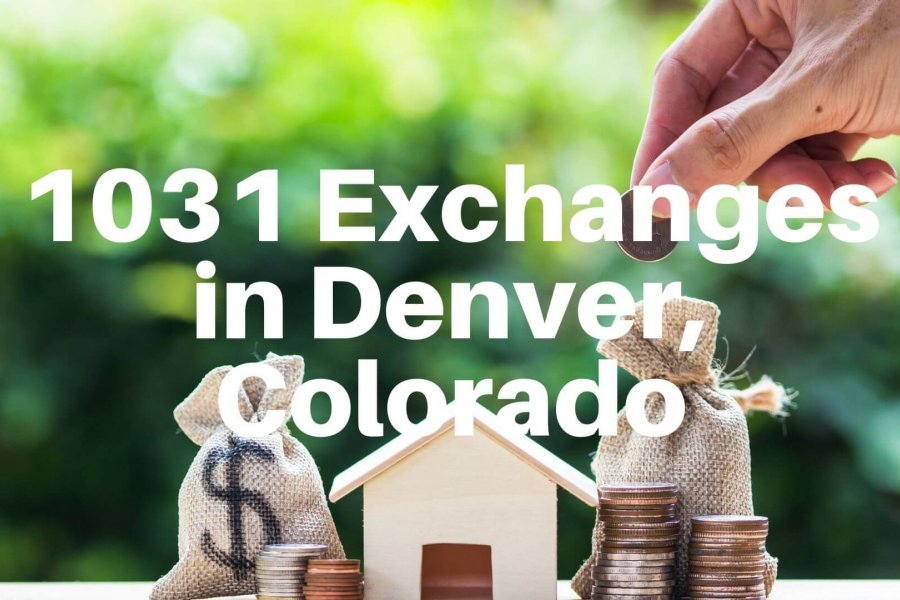The Ultimate Guide to 1031 Exchanges in Denver

Investors in Denver, Colorado are always looking for ways to manage their business and money well in the real estate market. One way to achieve that goal is by using the 1031 exchange strategy. This article will provide basic information on a 1031 exchange for a real estate investor in Denver, Colorado.
Although 1031 exchanges are beneficial to your Colorado business, it will also be in your best interest to seek the services of a qualified intermediary, such as a professional company to walk you through some of the complicated parts of the transaction of these investment properties and ensure the fair market value.
What is a 1031 exchange?
Arising from the IRS tax code section 1031, the 1031 exchange is a transaction where you can defer paying for capital gains taxes when you sell your investment property. You can instead use the sales proceeds for reinvestments. The 1031 exchange however is limited to exchanging like-kind properties.
This simply means that the value must be similar or greater in comparison to the property you wish to exchange.

Why is a 1031 exchange important?
A 1031 exchange can be a great opportunity as a Colorado investor to pursue a more aggressive property portfolio growth. Real estate investors can purchase more assets that will generate more cash, leading to wealth creation.
Some Colorado business people can be wary of the tax burden that weighs down property sales. However, the 1031 exchanges allows you to diversify your business or investment property. You can defer the steep taxes that can reach 15% to 30% per property sold. Smart Denver, Colorado business people will take advantage of the 1031 exchange.
What are the property requirements for a 1031 exchange?
Same or greater property value
In order to qualify for a 1031 exchange, the property you purchase should hold the equal or greater value than your current investment. Hence, if you’ve successfully sold off a townhouse for $2 million, the property you want to purchase in that great neighborhood should be priced at a minimum of $2 million, too.
Categorized as an investment property
Another requirement for 1031 exchange in Colorado is that you must exchange one real estate investment for another. Let’s say, you have a condo rental, you must exchange it with another rental, not necessarily a condo unit but must also be used for business or investment purposes.
Exchanging a personal property for an office rental, for example, will not count as a 1031 exchange.
What are the time requirements for a 1031 exchange?
45 days
An investor is given only 45 days from the sale of the original property to select the replacement property.
180 days
An investor is given only 180 days to close the replacement property transaction once the relinquished property sale has also been closed.
Maybe it sounds easy to accomplish, but the days are fixed. They’re non-extendable and even weekends and holidays are counted as part of the set periods. Knowing this, you’ll want to fast-track the transactions to avoid being disqualified. It’s best to analyze potential issues before engaging in a 1031 exchange in Denver, Colorado.
What are the important deadlines and restrictions to remember in a 1031 exchange?
When you make up your mind to do a 1031 exchange to defer the capital gains taxes, you’ll need to sell your property. Once the sale is finalized, an escrow company will manage the sales proceeds and transfer them to a qualified intermediary’s exchange account.
You can’t complete a 1031 exchange without the help of a qualified intermediary. Their role is to safe-keep the profits earned from selling the original property, get the legal documents ready, and make sure that the transaction is compliant with the IRS protocol.

What are the different types of 1031 exchanges?
Investors can select among these types of 1031 exchanges in Colorado:
Delayed exchange
This exchange means you need to sell the original property first before you can buy a new property. Most investors prefer this method so they can save and utilize the proceeds to purchase the replacement property.
They just need to fast track and find a buyer for the exchange to close within the 180-day period. They also need to adhere to the 45-day deadline to identify a new property for the exchange.
Simultaneous exchange
This exchange means you need to perform the purchase and selling at the same time or within the same day. If not, you’ll risk paying for the capital gains taxes instead of maximizing the benefit.
Three ways for a simultaneous exchange to happen:
- Three-party exchange with an “accommodating party”
- Three-party exchange with a Qualified Intermediary
- Swapping deeds with another real estate property owner
Reverse exchange
This exchange allows you to find a property first before selling off your current property. In this type of transaction, you need to have reserved funds to ensure you can buy the new property as a replacement. Initially, it can sound burdensome financially but keep in mind that you’ll have more time to sell your current property.
Additionally, if the economy is on an upswing, you get more money because of property appreciation. Just remember that you still must follow the 45-day deadline to identify the property you wish to relinquish. The transaction would also need to be finished in 135 days.
What are the common 1031 exchange terms?
While performing a 1031 exchange, you want to avoid getting lost in translation. Here are some common terms you’ll encounter along the way:
- Relinquished property - this refers to the property you choose to sell
- Replacement property - a replacement property refers to the property you desire to purchase
- Like-kind property - this refers to properties that can be exchanged. They may be similar or not. Exchanges can run the gamut of exchanging raw lands with office buildings, and townhouses with commercial centers.

Final Thoughts
To sum it up, 1031 exchanges provide investors with an opportunity to leverage their property assets. However, this transaction needs an expert guide to successfully close the deal. It’s recommended to hire a property manager that specializes in 1031 exchange transactions.
If you need assistance to quickly accomplish a 1031 exchange in Denver, please contact Evolve Real Estate and Property Management. You want to use this wealth creation strategy properly to grow your property investments in Denver, Colorado.
